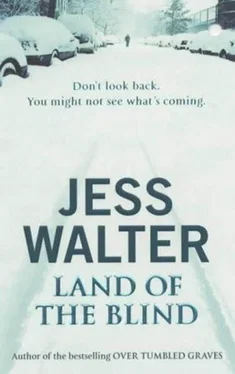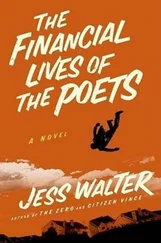Jess Walter - Land Of The Blind
Здесь есть возможность читать онлайн «Jess Walter - Land Of The Blind» весь текст электронной книги совершенно бесплатно (целиком полную версию без сокращений). В некоторых случаях можно слушать аудио, скачать через торрент в формате fb2 и присутствует краткое содержание. Жанр: Детектив, на английском языке. Описание произведения, (предисловие) а так же отзывы посетителей доступны на портале библиотеки ЛибКат.
- Название:Land Of The Blind
- Автор:
- Жанр:
- Год:неизвестен
- ISBN:нет данных
- Рейтинг книги:3 / 5. Голосов: 1
-
Избранное:Добавить в избранное
- Отзывы:
-
Ваша оценка:
- 60
- 1
- 2
- 3
- 4
- 5
Land Of The Blind: краткое содержание, описание и аннотация
Предлагаем к чтению аннотацию, описание, краткое содержание или предисловие (зависит от того, что написал сам автор книги «Land Of The Blind»). Если вы не нашли необходимую информацию о книге — напишите в комментариях, мы постараемся отыскать её.
Land Of The Blind — читать онлайн бесплатно полную книгу (весь текст) целиком
Ниже представлен текст книги, разбитый по страницам. Система сохранения места последней прочитанной страницы, позволяет с удобством читать онлайн бесплатно книгу «Land Of The Blind», без необходимости каждый раз заново искать на чём Вы остановились. Поставьте закладку, и сможете в любой момент перейти на страницу, на которой закончили чтение.
Интервал:
Закладка:
She once went six months without a dead body.
But as she reaches the top step she recognizes that faint smell and it breaks her heart a little. Six months. And when she tries the doorknob to the apartment above the carriage house, it turns easily in her hand. Caroline Mabry takes a breath and pushes through the door.
The eyes may be confused in two ways… when they've come from the light into the darkness and when they've come from the darkness into the light.
– Plato, The Republic
VI
1
Who am I to describe Eli Boyle's life, to trace its shape – the outside surfaces, the dates and places, the beginning and the end – when, admittedly, I never took the time to learn what existed inside that form, the truth of who Eli was, what drove him, what scared him, what he dreamed?
When this story comes out, the news media will not be so judicious, of course. They will sum up Eli's life with one false clichй or another: rags to riches to rags again, or the impersonal nature of computers, or the profane irony of a love triangle. And perhaps these stories are true; I honestly don't know what Eli believed, or what he thought about or – certainly – what his story meant. My own expertise lay simply in the horror of a shared adolescence, from its birth in humiliation at the Empire bus stop to its ending in betrayal in a wine-soaked room at the Davenport Hotel.
The world continued after the prom, of course, weightless days that left no imprint on me. True, my former friend Tommy Kane never spoke to me again, but that was of no great import – although I suspect it was he who threw my yearbook in the boys' room toilet. (A janitor fished it out; even today, many of the nineteen pages on which I was photographed remain wrinkled and stained.)
Dana and I did not get together after the prom. I'd like to believe this was because of our concern for Eli's feelings, but it likely had as much to do with a kind of inertia caused by the rigidity of our high school personas. At school, I was disheartened to see Dana retreat back into her loose clothing and pigtails, to see her stop wearing makeup. And I was equally surprised that my attraction to her could turn itself off so easily. I knew what lay under those baggy clothes, and yet she seemed too much like the old Dana, too bookish, too girlish, too logical in comparison to the curvy collections of fluff that I found attractive. I began to think of the girl in the hotel that night as someone else entirely. But this retraction wasn't entirely my doing. Something changed for Dana, too. She began to hesitate when she saw me, to blush when I said hi, to avoid me in the halls. It occurred to me that she might even see me as a mistake, as a blemish on her otherwise perfect school record, the B she never got. And when I read what she wrote in my wet yearbook (… I'll always care for you. Be good. Dana), I knew I'd been kissed off.
Susan and I were finished, too. She didn't sign my yearbook, but at school one of her friends handed me a note from her that read, in part, We are fucking through – although my teenage dyslexia transposed the last words to read We are through fucking – and I was understandably, or maybe just hormonally, heartbroken. I'd like to say that I was through with women built like Susan (all facade, no structural integrity), and that I had learned to appreciate the charming architecture of women like Dana (who am I kidding? There were none), but this is a story of weakness, not of strength.
I got no yearbook wishes from Eli. No notes or secondhand threats. I suppose I just stopped existing for him. I thought about apologizing, telling him that Dana and I weren't going to see each other, that it had been a mistake, but I worried about making it worse, making it seem like I'd stolen something I didn't even want, that I'd made out with his date just to spite him. While I tried to figure out what to say, one morning my shoes and jeans and T-shirts – the entire costume from Eli's ill-fated remake – appeared on my back porch, neatly folded.
School ended before I figured out what to say to Eli, or to Dana. Of course I could've picked up the phone anytime, but something had given way in me. With college looming, the final hours of my childhood held little interest for me, like the last, hot afternoon of grade school – report cards mailed, desks cleaned, every eye on the needle-thin second hand making its glacial sweep around the clock face.
Days lost their mooring and drifted, banged one into the next, and I moved within them in a languid, sun-bleached daze. Summer bled out beneath my feet. My life took on the quality of nostalgia, sweet and distant and beyond change, my family receding into an album of memories. I crafted a schedule in which I rarely saw them, working as a dishwasher in a restaurant all night and sleeping most of the day. I was about to become the first in my family to go to college, and my parents were overly respectful of this; they kept their distance, unsure how to treat me. They fed me and housed me but stayed out of my way, and I ate and rested and brooded like a climber the night before summit.
But Ben had no patience for this new state of affairs. He'd just turned sixteen, and though he remained small (a shade over five feet six inches tall, broom thin), he was dealing with sprouts of hair beneath his arms and on his chin, and the divining-rod erections that govern most sixteen-year-old boys. I'd always been a sort of tour guide through his adolescence, and now that it was finally getting good, Ben couldn't understand where I'd gone, why I wouldn't drive to the lake with him or shoot baskets or talk about girls – why I wouldn't sit on the porch at twilight and laugh at things so familiar we barely needed to mention them.
"Let your brother sleep," our mother would say as I lay in bed all afternoon, the pillow over my head, trying to breathe in long, sleepy rises and falls, pretending I didn't know Ben was in my doorway. Eventually, he got the message; by summer's end, he'd just nod when he saw me. When I left for college, he was camping with friends.
So that's how my last summer as a child passed, in chrysalis hibernation, closed off to the people in my life, until the first day of September arrived and I emerged coolly into our driveway, a suitcase in each hand. My sisters hugged my hips. My mother cried.
My father handed me the keys to their old Dodge Colt, as if I'd just won a very bad game show. "I can't pay for very much college," he said. "But I can sure as shit get you there."
"Thanks," I said, and shook his hand. Then I climbed in the car.
I should have known, of course, that I was leaving behind unfinished business, not just with Ben, but with Eli and Dana. But all that summer, solitude had worked like a drug on me, and I happily allowed old intentions and obligations to fall away. I believed what TV teaches you – that change is only an episode away, the past is dead, and the only world is the one we're in.
I drove my father's car against the grain of late-summer clouds, drifting west on I-90, shadowing the river valley through the city of my birth, my arm resting on the open window, the wind rippling my sleeve. I crested Sunset Hill and saw Spokane recede in the rearview, a world beneath me, the last light glinting off the downtown buildings. The whole thing felt intimately familiar; the beginning of every daydream I'd ever had.
And that was it. September came and we did what people do – Dana and Eli and me. We went to college. More than a decade would pass before we would speak again.
Dana went to Stanford, just as she'd told everyone she was going to. She rarely came home from Palo Alto, but I heard through mutual friends that she joined a sorority and embraced the blossoming that she'd only flirted with in high school – tight skirts and torn jeans, filtered smokes and cheap well drinks. After this brief rebellion she cannily double-majored – she must've had a psychic student adviser – in management information systems and marketing. She became part of a group of Stanford grads and their friends that billed themselves as a sort of Bay Area technology salon – a tight community of young creative computer and business students who lived in and around Silicon Valley, "positioned," as they would say, to be the vanguard of all that was coming, and to become quite wealthy in the next few years.
Читать дальшеИнтервал:
Закладка:
Похожие книги на «Land Of The Blind»
Представляем Вашему вниманию похожие книги на «Land Of The Blind» списком для выбора. Мы отобрали схожую по названию и смыслу литературу в надежде предоставить читателям больше вариантов отыскать новые, интересные, ещё непрочитанные произведения.
Обсуждение, отзывы о книге «Land Of The Blind» и просто собственные мнения читателей. Оставьте ваши комментарии, напишите, что Вы думаете о произведении, его смысле или главных героях. Укажите что конкретно понравилось, а что нет, и почему Вы так считаете.











